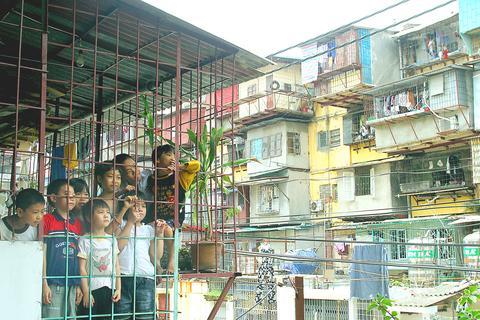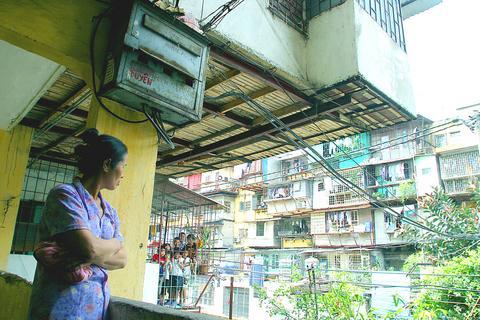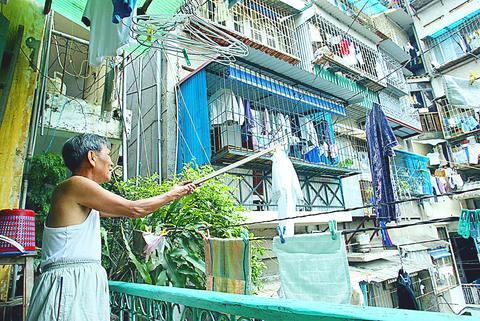Tigers face extinction in the forests of Indochina, but it's easy to find a trace of the big cats in Vietnam's capital, although not in traditional herbal medicine stores.
In fast-expanding communist Vietnam, the "tiger cage" has been helping thousands of residents battle shrinking living spaces.

PHOTO: REUTERS
For decades, ingenious dwellers in cramped apartments have built frames of steel bars, dubbed tiger cages, to transform balconies or common corridors into spaces where they can cook, sleep, dry clothes, raise pigs or do a spot of gardening.

PHOTO: REUTERS
Historically, tiger cages have had a notorious connotation, as slang referring to French prison cells built by Vietnam's former colonial master in the early 1860s to house nationalist insurgents.
But these days the term tiger cages has a happier meaning.

PHOTO: REUTERS
"It gives freedom to a family within that space," said Nguyen Duc Hoan, 36, who lived from 1992 to 2001 in a 32m2 fifth-floor flat with his wife.
The housing innovation is a common sight at state-built apartments in Ho Chi Minh City, Hanoi, Haiphong and Danang, Vietnam's four largest cities and home to nearly 14 million of the Southeast Asian nation's total population of 81 million.
A recent survey in the four cities by the Construction Ministry reveals that each resident is confined to an average living area of 3m2 to 6m2.
SAFE PLAYGROUND
Hoan, who is a private steel trader, said the tiger cage's steel frame, though not constructed according to any code, helps deter break-ins and creates a safe playground above the bustling streets for children, including his son.
"The security reason is the primary goal as doors and windows are all wooden," he said. "People never thought of it as an architectural solution."
Hanoi built its first four-story residential buildings in the late 1950s, initially for state employees. The tiger cage emerged only when the next generation moved in.
In the next 20 years, buildings made from concrete panels sprung up, often with eight families on a floor sharing two pairs of communal toilets and kitchens, an influence of communist allies the Soviet Union and North Korea.
Now the several-decades-old 430 buildings in Hanoi are home to more than 137,000 people but are no longer an ideal accommodation or a sought-after state reward.
Half of them are slum houses with narrow corridors and stairways, low ceilings and leaking pipes. Coal-fired stoves and a lack of parking add to the difficult conditions.
"The daily living is very inconvenient, as many generations share the same one space," Hoan said.
But it isn't easy to upgrade.
"Not everyone can afford to buy a larger place," said a Vietnamese economist who has been living in a 60m2 flat in the past five years in Hanoi.
Hanoi's housing department said 22 of the 430 old buildings must be demolished and another 267 needed urgent repair.
Some who have managed to escape the confining spaces are grateful.
STILL A DREAM
In 2001, Hoan moved to a new house, with a small yard.
"The first feeling is about the freedom, as I can hang out late and come home any time I like and I don't have to push my motorbike all the way up to the fifth floor," he said.
In the old days, an elderly woman who managed the car park at his apartment building locked it up and went to bed at 10pm.
The government controls 21.3 million m2 of residential space, or just 2.9
percent of Vietnam's total, and is unable to pay for the upkeep.
Hoan said his place was repainted just once in nine years.
Yet a flat remains the goal for middle-class people and migrants moving in from the countryside, with monthly rentals ranging between 600,000 dong and 2 million dong (US$38 to US$127).
"It's still a dream for many people to have," said the economist. Per capita income is US$400 a year in Vietnam.
Hoan's fifth-floor flat was sold for 400 million dong (US$25,445), a sum that takes 66 years for state employees on a monthly income of 1.5 million dong (US$95) to accumulate -- provided they can save 500,000 dong each month.
Speculation has been driving up prices on anything from old government-built flats to swanky condominiums.
The government has set an ambitious goal of raising the average living area to 15m2 per person by 2010, with different types of homes to match varying tastes.
As new condominiums are built to replace the old-fashioned flats, new owners vow to hang onto their extra space as long as their families grow.
But the economist said the tiger cage would only become extinct once security of flats was assured.
"The steel bars will still exist for protection," Hoan said. "There would still be a modified tiger cage."

Cheng Ching-hsiang (鄭青祥) turned a small triangle of concrete jammed between two old shops into a cool little bar called 9dimension. In front of the shop, a steampunk-like structure was welded by himself to serve as a booth where he prepares cocktails. “Yancheng used to be just old people,” he says, “but now young people are coming and creating the New Yancheng.” Around the corner, Yu Hsiu-jao (饒毓琇), opened Tiny Cafe. True to its name, it is the size of a cupboard and serves cold-brewed coffee. “Small shops are so special and have personality,” she says, “people come to Yancheng to find such treasures.” She

In July of 1995, a group of local DJs began posting an event flyer around Taipei. It was cheaply photocopied and nearly all in English, with a hand-drawn map on the back and, on the front, a big red hand print alongside one prominent line of text, “Finally… THE PARTY.” The map led to a remote floodplain in Taipei County (now New Taipei City) just across the Tamsui River from Taipei. The organizers got permission from no one. They just drove up in a blue Taiwanese pickup truck, set up a generator, two speakers, two turntables and a mixer. They

Former Chinese Nationalist Party (KMT) chairwoman Hung Hsiu-chu’s (洪秀柱) attendance at the Chinese Communist Party’s (CPP) “Chinese People’s War of Resistance Against Japanese Aggression and the World Anti-Fascist War” parade in Beijing is infuriating, embarrassing and insulting to nearly everyone in Taiwan, and Taiwan’s friends and allies. She is also ripping off bandages and pouring salt into old wounds. In the process she managed to tie both the KMT and the Democratic Progressive Party (DPP) into uncomfortable knots. The KMT continues to honor their heroic fighters, who defended China against the invading Japanese Empire, which inflicted unimaginable horrors on the

Hannah Liao (廖宸萱) recalls the harassment she experienced on dating apps, an experience that left her frightened and disgusted. “I’ve tried some voice-based dating apps,” the 30-year-old says. “Right away, some guys would say things like, ‘Wanna talk dirty?’ or ‘Wanna suck my d**k?’” she says. Liao’s story is not unique. Ministry of Health and Welfare statistics show a more than 50 percent rise in sexual assault cases related to online encounters over the past five years. In 2023 alone, women comprised 7,698 of the 9,413 reported victims. Faced with a dating landscape that can feel more predatory than promising, many in